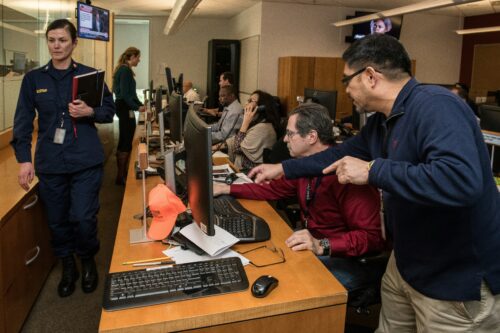Lead, Mentor, and Get Out of the Way
Margie Moulin, CPE RPL
Principal Consultant, Derek Poarch and Associates, LLC

Reading Derek Poarch’s blog on the ‘Traits of Successful 9-1-1 Leaders” recently had me thinking more about leadership, specifically, how these traits apply as we find ourselves in the later stages of our careers.
Many of us in public safety have heard the term “ROD” (retired on duty) or “ROAD” (retired on active duty) at some point in our careers. This term has been used to describe public safety employees, most often law enforcement, who are filling a position, but only doing the bare minimum requirements, basically becoming complacent, and often, negative. This can be seen in public safety communications as well, and 9-1-1 leaders are not immune to this.
Whether this is due to burn out, cumulative stress, or other factors, leadership in public safety communications is far too important to leave this unaddressed, even if you are the one experiencing it. Addressing it doesn’t necessarily mean you have to leave your job, but it does mean you need to fix it. The first thing is to remember your responsibility to lead. Dereks blog described the traits to successful leadership, and taking the time to evaluate your own behaviors against these eleven traits is a good start.
Are you holding yourself accountable for your actions? Are you being honest with yourself and others about your performance, your abilities, and your struggles? Are you still able to solve problems and be decisive, or are you frozen and having difficulty moving forward?
This is where courage really stands out. It takes courage to look at your own performance and ask yourself whether you are still the right person for the job. It takes courage to reach out for help when you need it, and take steps to change direction, refresh yourself and your skills, and become a strong leader again. This might mean new training, pushing yourself out of your comfort zone, using the resources in your employee assistance programs or health and wellness programs, or asking others for help. Even this is an example of leading. You do not expect your employees to be unaffected by the job, or to be perfect, so don’t expect it of yourself.Just make sure you recognize it and fix it when you aren’t perfect, as you would hold your team members responsible for doing.
Another step we need to look at in this phase, and ideally long before, is our ability to prepare others to lead by mentoring. As we look towards retirement late in our careers, we need to make sure we have been mentoring others to take our place. A great indicator of successful leadership is the ability for the leader to leave the organization without impacting its performance. This shows we have prepared others and the mission to serve our field units and communities will continue to be successful without us.
Tragically, our profession recently lost a strong leader unexpectedly. The sudden loss of this Director created the need for a dispatch supervisor to step up to the director’s position with no warning. I spoke with this supervisor recently and with another member of leadership in that center, and both expressed that the Director had always insisted another member of the leadership team be involved with, or at least aware of, all the projects the Director was working on. This enabled them to learn and prepare for future leadership roles, and to ensure the project’s success was not contingent on one person. This is an example of a successful leader with the foresight to set his agency up for success through mentorship.
Lastly, there comes a time in all our careers where we must ask ourselves if it is time to simply get out of the way. This is a more difficult question than it sounds like, and it means looking outside of ourselves. Many in our profession must meet a certain age and/or number of years of service to earn a pension. Even if you do not have a pension, your retirement investments, or simply your financial situation, may not allow you to leave, even if you need to.
Public safety communications is far too important to allow leaders to remain when they become complacent or ineffective. Leaders know it’s about more than a paycheck. Yes, that sounds harsh, but the simple fact is, your ability to lead impacts the performance of your center, and the performance of any emergency communications center impacts the lives of the communities and public safety responders we serve. Remember, this does not mean you have not been a successful leader, in fact, an important step while you are considering this is to look back at all your successes throughout your career. Sometimes reviewing all the positive changes you have made is enough to reinvigorate you and bring back your passion for the position you hold.
If you find yourself questioning your leadership passion, consider these options: find the tools and do the work to change and find your passion again, prepare your replacement and mentor them to lead, or take the steps to change careers, retire, or otherwise find your next adventure.
Simply put, leaders must be able to lead, to prepare others to lead, and to know when it’s time to get out of the way.
